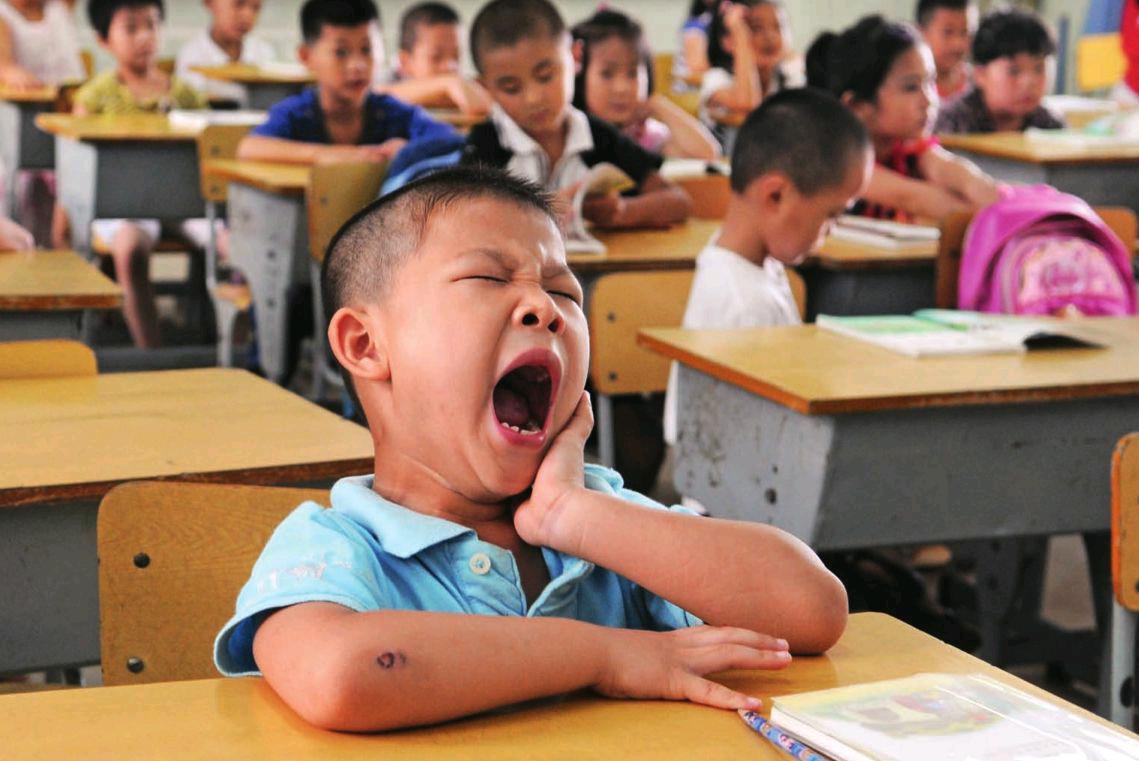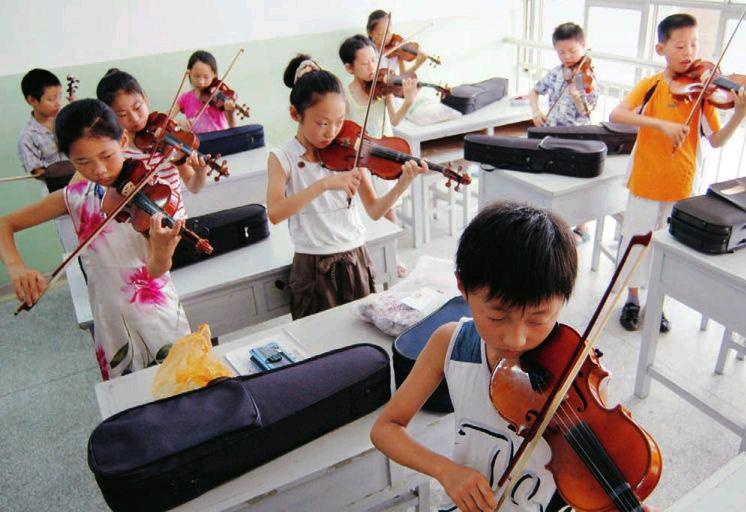Lost Childhood
2014-09-27BystaffreporterLI
By+staff+reporter+LI+WUZHOU
EVERY school day Dongdong wakes up at 6:20. Still half asleep, his mother has to force him to drag on his clothes and brush his teeth. Within 15 minutes he has to be in the car, ready to leave, which means his breakfast has to be consumed on the way. If it is winter, the sun has not yet risen.
Depending on traffic, if there is no congestion, it will take Dongdong 50 minutes to arrive at Zhongguancun No. 3 Elementary School with the three other students who share the car. When I asked Dongdong about his dreams for the future, the 10-year-old boy said, “To sleep in for once!”
Long Commutes
Dongdong lives about 15 minuteswalk from an elementary school. He travels over 10 kilometers to get to school, not because there is a shortage of schools, but because Dongdongs mom finds the local school to be mediocre. Zhongguancun No. 3 Elementary School, on the other hand, is one of the best schools in Beijing. Pupils there are more likely to get into a good junior high school, which means better odds at a good senior high school and a good university.
For this reason many parents send their children to schools far away, often relying on relatives, friends or cash to transport their children to one of quality. Once they get in, well-off families try to rent an apartment near the school; those of more modest means, like Dongdongs family, often co-rent a car to take the kids to school. Poorer families, who cant afford to rent a car, can only send their kids to school by bus. On buses and subways it is common to see pupils travelling long distances and even falling asleep on the way to school.
Experts recommend that children under 12 sleep at least nine to 10 hours a night. However, Chinese elementary and middle school students are sleeping less and less. According to a 2010 report by the China Youth & Children Research Center, Chinese elementary and middle school students slept seven hours and 37 minutes on average on weekdays, one hour and 22 minutes less than their peers in 2005. Nearly 80 percent of students got insufficient sleep on weekdays and over 70 percent got insufficient sleep even on weekends.
Heavy Burden of Homework
Although school finishes at 3:00 p.m, Dongdong usually doesnt get home till 5:30 p.m. While mom is cooking, he is doing homework. After dinner he has to do homework for another half an hour.
To improve their rankings and attract high quality students, schools compete each other to outdo the admission rates of famed middle schools. Also, teachers salaries are linked to students test achievements. For these reasons many schools have high requirements for homework, extra lessons and frequent examinations, especially for higher grade students. In one extreme incident, three 10-year-old students in Jiangxi escaped their homework burdens by jumping off a building together.
Mr. Wang has a son who entered elementary school two years ago. At the beginning of school, the teacher asked each student to write down their homework assignments in a notebook every day, so parents could check to make sure they did their homework. Last year, Beijing Municipal Commission of Education instructed schools to reduce homework burdens and began spot inspections. Teachers, afraid of these unannounced checks, cancelled the notebook assignments. But rather than cutting back on homework, they began texting homework assignments to parents cell phones. Moreover, Mr. Wang said, teachers always tell parents to make pupils recite paragraphs from textbooks and write words from memory so that parents can share the burden of their childrens education.
The homework overload means that not only are children sleeping and exercising less, but also spending less time with their parents. A mother in Qingdao posted an article online titled “Save Our Kids,” which was picked up by many other websites. “When my daughter was little,” she wrote, “she would toddle along towards me when I got back from work. In the kindergarten stage, she would run into my arms. At the start of elementary schooling, putting aside her homework, she would still come to me and chatter incessantly. However, since the fifth grade, she has become so buried in homework I can only see her from behind.”
Education departments at different levels have enacted policies to reduce student stress. Many provinces and cities have issued detailed policies restricting homework levels according to their grades, with less than an hour of homework at the highest grade of elementary school, and even no homework allowed for first- and second-grade kids.
However, not all parents are concerned about the homework overload. Some parents even give their children extra homework, in addition to their schoolwork. After schools followed the policy of reducing students homework burdens, some parents asked their teach-ers to restore the homework burden to keep their kids from lagging behind. As one netizen complained to the Beijing Evening News, “Without homework, my kid just watches TV, plays computer games and with his friends outside. So he fails his exams. I feel really worried when my child has no homework.”
Another boy complained that, now that the schoolwork burden is reduced, his mother gives him assignments in English and maths to keep him busy.
Holiday or “Class” Days?
On school holidays Dongdong attends “interest classes.” He “used to take over 10 interest classes like Go, Chinese Chess, swimming, violin, calligraphy, robotics, traditional Chinese painting, and maths,” Dongdongs mother said,“but now, we have reduced his burden. He quit almost all his interest classes except painting, and some like English, maths and writing which are related to academic subjects.”
This is Dongdongs extracurricular schedule: two hours of English on Wednesday evening and Saturday afternoons; one and a half hours of writing on Friday evening; Hack Maths on Sunday morning and one and a half hours of Chinese painting in the afternoon. Dongdong also takes 10-day long English courses during summer and winter vacations.
In the building where Dongdong attends Friday writing classes, I saw a whole floor occupied by dozens of training centers, all full of children who had studied for five days straight. Downstairs were adults drinking and looking forward to the weekend.
I randomly interviewed 20 students from various grades of three elementary schools in Beijing. Eighteen said they take extracurricular classes, and more than half take three or more. An online investigation by the Peoples Daily found that 68 percent of children take tutorial classes, 53 percent of which pertain to Chinese, maths, English or the Mathematics Olympiad. Obviously, like their parents, children in big cities are under more pressure than their peers in smaller cities.
Why do parents put children in so many classes? After investigation, I found that some parents want their children to have a “specialty”; others consider it an advantage in applying for higher schools, and some even do so under the pressure of other kids having attended, fearing their children might lag behind.“Most students study Math Olympiad outside of school; if you dont, you feel left out,” said one parent who declined to be named. “Mathematics Olympiad does not guarantee entrance to a quality junior high,” she added, “but if you dont participate, you wont even have a chance.”
Under current policy, all students can attend the nearest junior middle school. But good schools are selective and scarce. To send children to a “good school,” parents try every possible means to raise the odds of admission –either through high scores or a strong list of extracurricular activities. Before the introduction of Beijings new school entrance policy that requires students to attend nearby schools, some students were accepted based on high levels of artistic or athletic ability, or by recommendations by training centers. The “king of certificates,” reported on by many media, is a Nanjing fifth grader with 44 certificates. According to public reports, 50,000 Beijing students participated in the 2013 Mathematics Olympiad; Zhejiang contributed 66,000 and Wuhan 15,000. However, only a lucky few are talented enough to be recommended to famous middle schools. One student I interviewed studied Mathematics Olympiad in two separate training schools to increase his odds.
The maths fad is fueled by training centers for commercial reasons. Many parents complain about the burdenreduction policy, claiming that the rule forced them to seek help from private training schools.
Looking Together for a Way Out
Heavy burdens are inescapable for Chinese children and becoming a serious social problem. Every year, NPC(National Peoples Congress) deputies and CPPCC (Chinese Peoples Political Consultative Conference) members in annual sessions call for reduced academic burdens. Educational administrators have acted by cancelling municipal and county-level exams, reducing test frequency and prohibiting rankings based on exam results. However, these measures have had little effect.
Homework overloads result in short sleep, high myopia rates (22 percent) and poor communication with families. It also deprives children of happy childhoods and social development.
A recent report The Reason for Emigration states that over 60 percent of the Chinese middle class chooses to emigrate because of a dissatisfactory education system. One of my college classmates emigrated to Australia four years ago, for fear of his children losing their childhood. But only a few may obtain permission to emigrate.
According to some experts it is relatively easy to administer schools; parents are the key issue. “Tiger Mothers”and “Wolf Fathers” insist on studentsadvancing their academic credentials, even at the expense of their childrens happy childhood, because of the scorebased high school and college admission system. “Entrance exams for high schools and colleges have formed a shackle that binds students,” said famous educational commentator, Xiong Bingqi, about the importance of reducing academic burdens. “They overwhelm students with work.”
Education authorities continue to explore targeted policies. A recent reform prohibits any form of selective examination during compulsory education and prohibits competition or awarded certificates as a basis of admission. Public schools are now forbidden from holding selective training classes and increased supervision is placed on extracurricular training schools.
In Jiangsu and Hainan, local administrators are trying to narrow the gap between schools by promoting mobility of principals and teachers among different schools and encouraging quality schools to form education groups, expanding and dispersing quality teaching resources instead of concentrating them in a small group of schools. Last October, Beijing announced that the maximum score for the English college entrance exam will be lowered from 150 to 100, and the Chinese maximum will be raised from 150 to 180. Along with restrictions on study loads and the Maths Olympiad, intensive studies in maths and English have decreased.
Academic burdens are also elaborated upon in a communique by the Third Plenary Session of the 18th CPC Central Committee in 2013. The report requires a gradual reduction in the urban-rural education gaps and greater coverage of quality education resources through information technology, standardized schools, and teacher exchanges. The new measures also aim to radically reduce academic burdens by abolishing the practice of naming “model” schools or classes.
As a more radical measure of the communique, schools are required to“continue education and examination reforms by evaluating students not only by final exam scores...Students should be allowed to retake certain exams that decide their enrollment.” Schools are also attempting credit exchanges between colleges, vocational and adult schools in order to broaden opportunities for study.
The Ministry of Education says it will soon introduce a plan on reforming the college entrance exam system to match the ongoing education reform. Given the current educational environment, only a top-down reform can fundamentally change the education scenario at the grassroots level. Then childrens onerous study burdens really can be alleviated.
